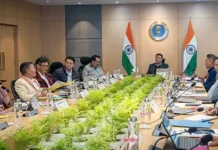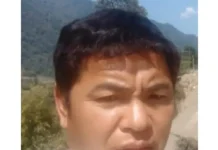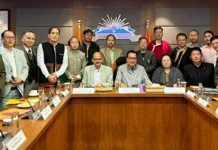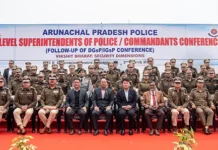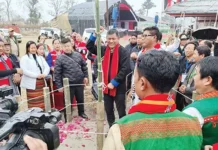Monday Musing
[ Bengia Ajum ]
The entire state was shocked when an organisation named the United Tani Army (UTA) recently issued a statement to the media, opposing the construction of mega dams in the state. The group also called for the relocation of Chakma refugees, and sought the cancellation of certificates issued to non-APST persons claiming to be APST. All three are burning issues with the potential to trigger an emotive reaction from the tribal communities of the state.
The timing of the statement is also interesting. It comes at a time when massive protests have erupted against the deployment of central and state armed police to assist the NHPC in conducting a pre-feasibility study for the proposed Siang upper multipurpose project. Locals who will be affected by this project have strongly protested in Siang and Upper Siang districts. The situation in the areasremains tense. Similarly, the state has been gripped by the ‘offspring’ issue, with many organisations calling for the cancellation of scheduled tribe certificates issued to children of tribal women married to non-APST men. Therefore, it seems that the UTA issued the statement to gain support from the disgruntled youth. There is a real possibility that frustrated youths might join the outfit if they feel that injustice is being done to them by the state government. The state government cannot simply dismiss the UTA as an attention-seeking group.
The UTA is led by Anthony Doke as chairman. Doke was previously part of the National Liberation Council of Taniland (NLCT), which was formed around 2005. By the end of 2010, the state police had completely neutralised the group. Its operatives, including the main leader Doke, were arrested, and many surrendered voluntarily. At its peak, the NLCT had around 15 operatives, and several extortion cases were registered against them at various police stations across the state. After being released from prison, Anthony Doke tried to reintegrate into mainstream society and was running a restaurant business in Itanagar. It came as a big shock when, out of the blue, he emerged as the chairman of the UTA and issued a statement to the media. Security agencies believe that he is currently shuttling between Myanmar and Nagaland and has the blessing of Naga insurgent groups.
It is not clear what kind of influence the new organisation, UTA, will have on the state. The people of Arunachal Pradesh, in general, are peace-loving and do not support armed groups. Barring Naga insurgent groups, which have found traction in Tirap, Changlang, and Longding districts, armed groups have always failed to make inroads in the rest of the state. The way the NLCT folded up is a classic example. But now things have changed. With social media and its appeal to the youth, people can often get carried away, and this is where the risk lies. The UTA might try to take advantage of the sensitive dam issue to lure disgruntled youths. The state government will need to take steps to prevent such a possibility.

